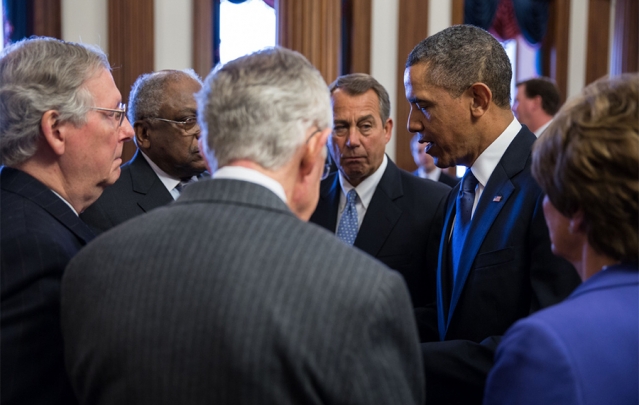If the Iran Deal Fails…
Robert Satloff/Politico/July 19, 2015
Congressional rejection of the nuclear deal wouldn’t be pretty, but a messy domestic political battle is a far cry from the president’s warnings of potential war with Iran. I have not yet decided whether the costs of the Iran nuclear agreement are worth its advantages. But I have reached one conclusion — President Obama’s argument that “the alternative to this agreement is war” is wrong. Let us assume that Congress overrides the president’s veto of a resolution disapproving the deal. What happens the day after? The president said that the congressional vote not only vitiates the agreement but destroys all international constraints on Iran’s nuclear program, after which the Iranians will race toward a bomb. That development, so this argument goes, would launch a regional nuclear arms race and likely trigger either American or Israeli military action to stop Iran’s march toward a bomb. With Iran likely to respond in either case by launching thousands of Hezbollah missiles into Israel, the result is war.
But is that really the most likely chain of events? No.
Faced with what would be a revolt in his own party, let alone near-universal Republican opposition, the president might have second thoughts about the Vienna deal. If he still wanted to salvage a nuclear agreement, this could compel him to go back to the bargaining table — first with his P5+1 partners and then with Iran — to secure certain improvements. These could include, for example, less time for Iran to delay inspections; a longer period for the maintenance of the arms embargo; or clear and agreed consequences spelled out for various types of Iranian violations. In other words, a vote for disapproval may just force the president to seek the proverbial “better deal.”But let’s say that the president holds firm to the current text, despite ignominious defeat on his flagship foreign policy achievement. Remember precisely what Congress will be voting on — to constrain the president’s ability to waive sanctions on Iran. That’s all. He will still have the prerogatives of his office to seek execution of the deal in other ways.
In that case, I believe the likely scenario would be as follows:
The administration has said it will seek U.N. Security Council endorsement of the Vienna accord in the coming days. That means the agreement will be enshrined in international law well before Congress acts, though that Security Council resolution will be timed so as not to take effect until after Congress votes on the deal. Then, in early September, let’s say Congress votes to override the president’s veto. Then, a determined president will still go to the annual convening of the U.N. General Assembly and announce that he will do everything in his power to execute the agreement. If Congress won’t let him waive sanctions, then — as he did with deportations of certain illegal aliens — he will order the State and Treasury Departments to focus their enforcement powers elsewhere. Congress will fume; a legal battle looms.
But even at that point, the United States is still not in violation of the agreement. According to the deal, the next step is that Iran has to implement its nuclear restrictions — mothballing centrifuges, redesigning the Arak plutonium reactor, etc. — to the satisfaction of the International Atomic Energy Agency. Most experts estimate that will take at least six months. Only after the IAEA certifies that Iran has met its requirements are the P5+1 countries and the United Nations required to implement their commitments to terminate (or, in America’s case, suspend) sanctions.
In other words, even if Congress denies the president waiver authority on Iran sanctions in September, he wouldn’t begin to use that authority until next spring, at the earliest. At that point, when he tries to make an end-run around Congress, Messrs. Boehner and McConnell can be expected to take their case to court. Eventually, the Supreme Court will decide. Perhaps the president will still be in office; perhaps he won’t. What does Iran do during this domestic political contest here in the United States? Does it chuck its enormous diplomatic achievements in Vienna for a mad dash toward a bomb? Highly unlikely. My hunch is that Iran will seek to exploit our internal squabbles to isolate America from its own negotiating partners. “We are very sorry to see small minds in Congress try to snuff out hopes for peace and mutual security,” savvy Iranian diplomats will say. “But we will not let them. Therefore, we will continue to abide by the terms of the agreement.
” That’s the best way for Iran to make sure that the European Union and the United Nations terminate their sanctions and, along the way, deepen divisions between Washington and its major allies. So, let’s put this issue into context. Congressional rejection of the Iran deal won’t be pretty. While it might convince the president to seek “a better deal” to win legislative support, we shouldn’t delude ourselves into thinking that we can just go back to square one with negotiations or that we can keep the current sanctions regime in place as if the past two years of diplomacy never happened. We will be in a different place, much grayer than before.
But that messiness is a far cry from war. In my view, the only war that may ensue from a congressional vote of disapproval is a war of words between our legislative and executive branches, eventually adjudicated by the Supreme Court. In other words, the worst-case scenario will be business as usual in Washington.
**Robert Satloff is executive director of The Washington Institute.























